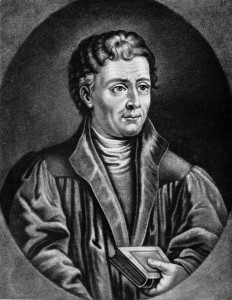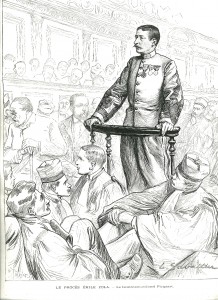 Johannes Reuchlin and Georges Picquart
Johannes Reuchlin and Georges Picquart
Not many people on either side of the Atlantic have heard of Johannes Reuchlin and his defense of the Talmud. But Reuchlin (1455–1522) deserves to be widely known as he took a strong stand against the prevalent prejudice of his day – in his legal brief, Ratschlag ob man den Juden alle ire Bücher nemmen, abthun und verbrennen soll, written at the behest of Emperor Maximilian I. This piece of work, which helped save the books from the flames, led to a head-on collision with the Dominicans, and their mouthpiece, Johannes Pfefferkorn – a converted Jewish butcher who hounded Reuchlin in diatribe after diatribe, and finally succeeded in instigating Pope Leo X to ban Reuchlin to silence.
Impassioned linguist and humanist
A jurist and Judge of the Swabian Bund, Reuchlin was also an impassioned linguist who, like other Humanists, studied the classics. His interests, however, extended beyond Latin and Greek to encompass Hebrew. He was the author of De Rudimentis Hebraicis (1506), one of the first Hebrew grammars written by a Christian scholar in Latin, a work which, incidentally, proved invaluable to Martin Luther in his translation of the Bible.
How is it that a devout Christian, like Reuchlin, took the trouble to delve into a linguistic domain that had long been considered obsolete at best by most of his contemporaries? For just as the Jews themselves were reviled as a people who, in rejecting Christ, had missed the boat, so, too, was their language and literature, though largely unknown, held in ill repute. Reuchlin was no particular friend of the Jewish people, whom he, like other “enlightened” Christians of his day, hoped to convert to the “true” faith through debate and disputation. He was primarily concerned for the fate of their books which he considered the foundation of Christian culture. And yet, his innate sense of justice and truth superseded any anti-Jewish sentiments he harbored. In answer to the question of whether the Jewish books were essentially “false,” i.e. “untrue,” Reuchlin insisted: “And even if in this regard the Jewish books may be false according to our way of thinking, they are not false according to their [the Jews’] way of thinking and according to their faith.”
Faith, Reuchlin firmly believed, cannot be imposed; and herein lies the justice of the man: for though he viewed the Jewish faith as wrong or misguided, he nevertheless supported the right of the Jewish people to adhere to it: “As to matters of faith, they [the Jews] are of the opinion that their faith is right and ours is wrong. Indeed, we find among certain Jews the view that every nation ought to be allowed to practice its own faith.”
Military man
Reuchlin’s conflict with the Dominicans and their dogged hounding of him in trial after trial turned into a kind of Dreyfus Affair of the 16th century, dividing the literate public into opposing camps. There is, in fact, a striking resemblance between Reuchlin and another unsung hero, Marie-Georges Picquart, an army officer and commander of the military intelligence of the French army. He acted as a military reporter for the Minister of War at the first court martial of Captain Alfred Dreyfus. Subsequently named chief of the army’s intelligence section, Picquart discovered that the memorandum used to convict Dreyfus of treason had been forged by a Major Esterhazy, the actual spy. Picquart was warned to keep his discovery a secret. Despite his personal dislike of Dreyfus and an ingrained anti-Semitism, Picquart, like Reuchlin, was fiercely committed to the truth. When he nevertheless went public with his finding, he was relieved of his appointment and himself accused of having forged the memorandum.
On stage
History is a tug of war between invisible conflicting forces conducted by flesh and blood individuals. Plays put persons and their actions under the microscope, and so, by imaginative extension, compel the spectator to come uncomfortably close. How can we fail to marvel at a man whose actions helped prevent the burning of books more than five hundred years ago in a land in which, as Heine presciently predicted: “Where they burn books, they will ultimately burn people.”?
Peter Wortsman is a writer, playwright and translator. His play Burning Words (German translation by Peter Torberg: Wo man Bücher verbrennt…Reuchlins Streit um das jüdische Schrifttum) will premiere on January 25, 2014, at the Kulturhaus Osterfeld in Pforzheim.

